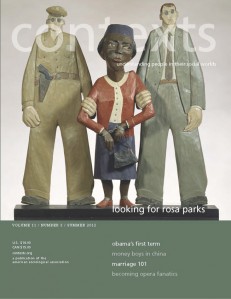
Summer 2012
Volume: 11 | Number: 3
Teaching a Hip-Hop Ecology
Sociologist Michael J. Cermak discusses what he learned while teaching environmental science with hip-hop in urban public high schools. This article provides an applied perspective of teaching at the crux of social justice and the environment. Read More
When History Intervenes
Sociologists tend to downplay the role of accidents, circumstance, serendipity, and luck. This essay describes three times that history derailed Michael Kimmel's research agenda, and how he "recovered." Read More
Rosa Parks, Strategic Activist
Accompanying Michael Schudson's feature on Rosa Parks, Aldon Morris provides commentary to enhance our understanding of Rosa Parks and her activism. Read More
Opera Thugs and Passionate Fandom
Using life stories and observing opera fans in Buenos Aires, Argentina, Claudio E. Benzecry shows how passion for a cultural object develops, gets refined and sustained over time and the consequences this has for personal identity. In addition, Benzecry argues that his observations at the opera house serves as a template to understand other forms of fandom, cultural consumption and passionate behavior more generally. Read More
But Madame, We Are French Also
Based on participant observation and interviews in the Parisian metropolitan region, sociologist Jean Beaman discusses middle-class and upwardly-mobile children of North African immigrants in France, who despite their upward mobility feel just as marginalized as other children of immigrants. Read More
Small Town, Big Totem
States build colossal and quirky sculptures celebrating local culture and place identity. Colby King and Matthew Cazessus provide a deeper look into these shrinking communities and explain how these sculptures work to maintain a sense of community and reaffirm local place identity in the face of dramatic demographic changes and economic uncertainty. Read More
Park(ing) Day
Park(ing) Day has become an international phenomenom since its inception in 2005. Gretchen Coombs explains how this urban intervention questions the use of public space and reimagines how urban public spaces can be repurposed to benefit local communities. Read More
The Rich and the Rest
Using data from the General Social Survey, sociologist Thomas J. Linneman shows that conservatives and liberals increasingly differ regarding government action to reduce income inequality. Rich liberals support government action nearly as much as poor liberals, while among rich conservatives there is very little support for government action. Read More
Rethinking Sexual Violence
Sociologist Nacy Whittier reviews the books Sex Panic and the Punitive State, At the Dark End of the Street, and Unspeakable. Each differently addresses sexual violence in relation to race, class, and criminalization. Read More
Neurodiversity
The neurodiversity movement emerged as an extension of the disability rights movement to include the those individuals with neurological differences. Micki McGee posits that neurodiversity is also a response to the neoliberalism of the past three decades that has (1) shifted responsibility for individuals with neurological and cognitive challenges back to the family, and (2) fostered a crippling speed-up in our workplaces while simultaneously requiring new levels of sociability and flexibility that render more people debilitated or disabled. The article concludes that demands for the rights of neurologically diverse populations may challenge the very framework of liberal personhood. Read More
